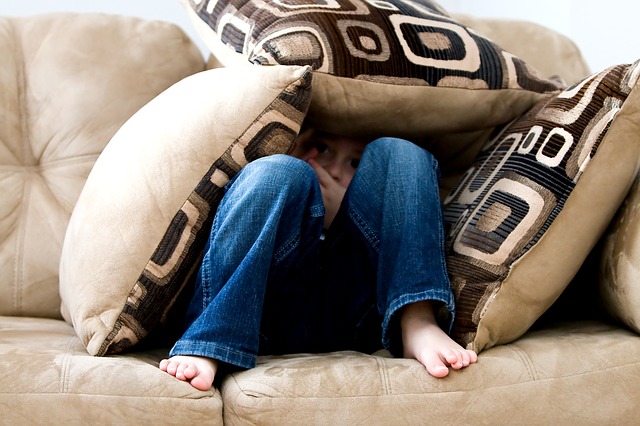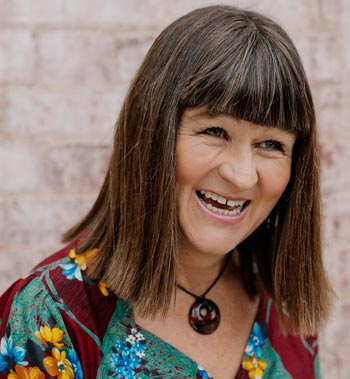A mother contacted me about her child who was 9-years-old at the time. He was so anxious that to go out of the house he needed to carry a bucket in case he vomited. There would always have to be a bucket left in the car. The mother was exasperated as his behavior has been severely impacting on the family’s life for many years.
A highly anxious 9 year old boy [case history]
This boy has an elder sister who is 19 years old who he adores. His sister is at university and is very easy going and has a great social life. These two siblings have parents who are very happy optimistic people. His mother said they can’t argue in front of their son (they hardly argue anyway!) as he can’t cope with even the slightest hint of conflict. Their son has two cousins with autism and two cousins who have some unusual behaviors as well.
His mother had a very happy pregnancy and ate very well throughout. She eats organic and as the boy’s sister is coeliac they have no gluten in the house. From when he was born, he was always clingy and always happier at home. Starting Kindergarten and attempting to begin school was extremely difficult, as he didn’t want to be away from home. He has always been painfully shy so the school attempted to bring in a psychologist. Getting him to school was so difficult, his mother eventually decided to home school him. He hasn’t vomited yet when out but is still afraid he will.

He has a very gentle face and appears very sensitive. He is very serious and appears older than his age. In the consult, this young boy was very good at describing how he felt, saying when he goes out of the house, he feels a lump in his throat, and gets nervous when there’s lots of people. He also says he feels lonely and depressed at times.
His fears include: the dark, being alone, dogs barking, loud noises, flying, thunderstorms and heights. He worries a lot about what may happen in the future, so needs to know exact plans, even if it’s about going to the shops. If plans change at all he will get very anxious and angry about changes. He has a couple of good friends who he loves to see but still gets very anxious going there. He doesn’t like to eat or drink at a friend’s place, as he would be too embarrassed going to the toilet. He could never sleep over at anyone else’s house. When he was very young, they went overseas but his mother said he loved it because the family was together all the time. Now his fear of flying is so bad they just don’t bother. The family can’t even go away for the weekend as he only wants to be at home.
He finds it difficult to get to sleep unless he’s really tired. He needs his mother to be in his bed for him to go to sleep.
He worries about his family members dying. When his great aunt died, he was devastated for months.
Things that he loves include animals, nature and swimming. However, he was too shy to do swimming lessons as he felt he was being tested then he became so embarrassed, he had to stop lessons. He has dyslexia, with great difficulty in reading and is so embarrassed about his messy writing, he doesn’t even want his parents to see anything he’s written.
When I asked a question, his mother would have to ask if it’s ok to tell me the answers as he would be embarrassed so easily and would only want his mother to answer particular questions.
There is no apparent cause for this boy’s anxiety but the nature of his anxiety led me to the remedy Ambra grisea.
- Extreme shyness and embarrassment
- Strong attachment to family and the home
- Doesn’t like to go to the toilet outside home
- Very anxious, worrying about many things
- Only happy and able to relax at home, especially with the family present
After taking the remedy, he gradually began to feel better about going out. After a month taking the remedy weekly, he was not feeling as sick going to his friend’s house and it only lasted 5 minutes. He said he feels lighter and happier and wanted to come to the clinic, instead of skype, as he felt happy with himself he could do this. He can now go to another aisle in the supermarket alone which his mother felt was a huge step for him. He has also started leaving notes around the house about what he would like for Christmas and having a go at reading.
Two years later I contacted his mother to see how he is going. She hasn’t given the remedy for several months as they felt he was doing so well. He now goes to a group where there are 50 young people his age where he does different activities such as archery. He would never have been able to do this previously. He still gets anxious going anywhere he feels pressure to make new friends. He is now happy to go to the city and visit different places. He has been camping with friends three times but his mother has needed to be there. They have rented a small cabin where there is a separate toilet as he still would be very anxious sharing a toilet. A few months ago, he taught himself to read and has since read the Hobbit. He is writing more now but is still struggling with spelling.
He can go to sleep by himself now but needs people to be around and although he can now sleep overnight away from home, he still needs his mother to be with him.
Now, if the mother is asked how to overcome shyness and social anxiety she would say to use homeopathy.
Although he has much less anxiety than before and his home school group have said over the last 6 months that he is a different person, I recommended they continue the remedy as there is still more that can improve.
In this particular case, the child had not been diagnosed. He had many of anxiety issues listed below in the criteria of Social Phobia or Social Anxiety Disorder.
Criteria for Social Anxiety Disorder (from DSM IV) (social anxiety symptoms)
A. Marked and persistent fear of one or more social or performance situations in which the person is exposed to unfamiliar people or to possible scrutiny by others. The individual fears that he or she will act in a way (or show anxiety symptoms) that will be humiliating or embarrassing. Note: In children, there must be evidence of the capacity for age-appropriate social relationships with familiar people and the anxiety must occur in peer settings, not just in interactions with adults.
B. Exposure to the feared social situation almost invariably provokes anxiety, which may take the form of a situationally bound or situationally predisposed Panic Attack. Note: In children, the anxiety may be expressed by crying, tantrums, freezing, or shrinking from social situations with unfamiliar people.
C. The person recognizes that the fear is excessive or unreasonable. Note: In children, this feature may be absent.
D. The feared social or performance situations are avoided or else are endured with intense anxiety or distress.
E. The avoidance, anxious anticipation or distress in the feared social or performance situation(s) interferes significantly with the person’s normal routine, occupational (academic) functioning, or social activities or relationships, or there is marked distress about having the phobia.
F. In individuals under 18 years, the duration is at least 6 months.
Children and Anxiety
In practice I see a wide variety of anxiety issues in children. Sometimes there is a definite trigger, such as a death in the family, parental separation, bullying or trauma. Many times there is no apparent cause. Often this occurs in children who are very sensitive and usually have a history of poor sleeping from birth. What I love about the approach in Homeopathy, is exploring how the individual copes in the world, physically, mentally and psychologically, rather than always finding a reason or ‘blaming’ the behavior on a person or a situation. How the child responds to their environment leads the way to the remedy. Each child presenting with anxiety may require different remedies as there will be different ways of coping. Some may respond with aggression or shyness, but the underlying issue I believe is still anxiety.

Kate Lukis (B.H.Sc. Nat., G.D. Counselling, P.G. Homeopathy) is a homeopath practicing in Melbourne.
Kate spent two years in India studying a post graduate course with various Homeopathic Doctors. During this time, she had the privilege to study under Dr Praful Barvalia, for nine months seeing up to 100 patients a day. Dr Barvalia specializes in Autism Spectrum Disorder, Mental Health issues in children, Attention Deficit Disorder, Learning Difficulties, Anxiety Disorders and other childhood disorders. Dr Praful works very closely with a Psychologist who is located at his clinic within a slum area. Each week Kate observed psychological assessments of children and adults of various disorders to clarify from a psychological perspective what the particular issues are and from there to ascertain the likely prognosis. Through these assessments, Kate observed quantifiable changes through Homeopathic treatment as found in reassessments from the psychologist three or six months later. It was here that Kate’s passion for working with children really grew.
“I would love the power of homeopathy to be recognised as such and so become more popular throughout Australia and the world.
Thank you to Kate Lukis for contributing this case of a highly anxious boy and the information about Social Anxiety Disorder.
